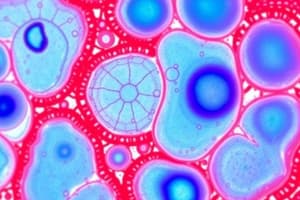Podcast
Questions and Answers
What is the main purpose of providing comprehensive slides and textbook references by the lecturer?
What is the main purpose of providing comprehensive slides and textbook references by the lecturer?
- To summarize the key points of the lectures
- To assist students in understanding the compulsory readings
- To support and enhance the learning experience (correct)
- To give an alternative perspective on the course material
Which of the following best describes the nature of the additional readings mentioned in the text?
Which of the following best describes the nature of the additional readings mentioned in the text?
- They are irrelevant to the course content
- They are compulsory and must be thoroughly studied
- They are summaries of the lectures
- They are optional and provide alternative presentations of lecture material (correct)
What contributes to making course 107 one of the premier undergraduate biology courses according to the text?
What contributes to making course 107 one of the premier undergraduate biology courses according to the text?
- It requires minimal effort from students
- It is known for being easy and straightforward
- It attracts students and lecturers from various university branches (correct)
- It has the most comprehensive textbook references
How are the lecturer's lectures described in terms of their depth and detail?
How are the lecturer's lectures described in terms of their depth and detail?
What is the lecturer's attitude towards starting off course 107 with the students?
What is the lecturer's attitude towards starting off course 107 with the students?
What is emphasized as a key feature of course 107 according to the text?
What is emphasized as a key feature of course 107 according to the text?
Which level of structural organisation in the human body involves atoms and molecules?
Which level of structural organisation in the human body involves atoms and molecules?
In the context of the human body, which example best represents the tissue level of structural organisation?
In the context of the human body, which example best represents the tissue level of structural organisation?
What is the highest level of structural organisation in the human body according to the text?
What is the highest level of structural organisation in the human body according to the text?
Which level of structural organisation includes Smooth Muscle Cells?
Which level of structural organisation includes Smooth Muscle Cells?
What is an example at the cellular level of structural organisation according to the text?
What is an example at the cellular level of structural organisation according to the text?
Which level of structural organisation involves the Digestive System?
Which level of structural organisation involves the Digestive System?
Which cell shape is ideal for secretion and absorption processes?
Which cell shape is ideal for secretion and absorption processes?
What type of epithelial cells change shape from flat through cuboidal to allow stretch?
What type of epithelial cells change shape from flat through cuboidal to allow stretch?
Which type of gland secretes substances into ducts or onto a surface?
Which type of gland secretes substances into ducts or onto a surface?
What type of epithelium lines the airways of most of the upper respiratory tract?
What type of epithelium lines the airways of most of the upper respiratory tract?
Which gland type secretes substances into both ducts and the blood?
Which gland type secretes substances into both ducts and the blood?
Which covering epithelium lines the kidney tubules and ducts of glands?
Which covering epithelium lines the kidney tubules and ducts of glands?
What is the basic functional unit of a myofibril?
What is the basic functional unit of a myofibril?
Which type of filaments primarily make up the I band in a sarcomere?
Which type of filaments primarily make up the I band in a sarcomere?
Where is the H zone located within a sarcomere?
Where is the H zone located within a sarcomere?
In which type of muscle tissue are intercalated discs found?
In which type of muscle tissue are intercalated discs found?
What do intercalated discs do in cardiac muscle tissue?
What do intercalated discs do in cardiac muscle tissue?
Which band in a sarcomere contains both thick and thin filaments?
Which band in a sarcomere contains both thick and thin filaments?
What is the function of desmosomes in intercalated discs?
What is the function of desmosomes in intercalated discs?
How do smooth muscle fibers differ from cardiac muscle fibers?
How do smooth muscle fibers differ from cardiac muscle fibers?
What is the role of intermediate filaments in smooth muscle fibers?
What is the role of intermediate filaments in smooth muscle fibers?
Which nervous system subdivision includes the brain and spinal cord?
Which nervous system subdivision includes the brain and spinal cord?
What is the major function of the sensory division of the nervous system?
What is the major function of the sensory division of the nervous system?
In what way do smooth muscle fibers resemble cardiac muscle fibers?
In what way do smooth muscle fibers resemble cardiac muscle fibers?
Flashcards are hidden until you start studying
Study Notes
Course Highlights
- Comprehensive slides and textbook references enhance understanding and engagement in lectures.
- Additional readings supplement primary materials, providing deeper insights into course content.
- Course 107 is recognized as one of the top undergraduate biology courses due to its thorough curriculum and interactive approach.
- Lectures are characterized by a high depth of detail, ensuring students grasp complex biological concepts thoroughly.
Lecturer's Approach
- The lecturer values starting course 107 by fostering a collaborative and supportive environment for students.
- Emphasis on interactive learning and real-world applications is a critical feature of course 107.
Structural Organization in the Human Body
- The atomic and molecular level represents the lowest structural organization in the human body.
- Examples of tissue level organization include muscle tissue, which groups similar cells for a common function.
- The highest level of structural organization identified is the organism level, encompassing the complete functioning body.
- Smooth Muscle Cells are categorized under the cellular level of structural organization.
Epithelial Tissues
- Simple cuboidal epithelium is ideal for secretion and absorption processes due to its cell shape.
- Transitional epithelium can change shape from flat to cuboidal, allowing for stretching in organs like the bladder.
- Exocrine glands secrete substances into ducts or onto surfaces, such as sweat glands.
- Ciliated pseudostratified columnar epithelium lines the airways of the upper respiratory tract for protection and mucus movement.
- Endocrine glands secrete substances directly into the bloodstream, in contrast to exocrine glands.
Muscle Tissue Structure
- The myofibril's basic functional unit is called a sarcomere.
- The I band in a sarcomere is primarily composed of thin filaments.
- The H zone is located in the middle of a sarcomere, featuring only thick filaments.
- Intercalated discs, found in cardiac muscle tissue, facilitate communication and synchronization between muscle cells.
Muscle Fiber Differences
- Intercalated discs in cardiac muscle tissue enhance connectivity and electrical conduction.
- The A band in a sarcomere contains both thick (myosin) and thin (actin) filaments, enabling muscle contraction.
- Desmosomes in intercalated discs provide mechanical strength and stability during contractions.
- Smooth muscle fibers differ from cardiac muscle fibers in structure and control mechanisms, reflecting their diverse functions.
- Intermediate filaments in smooth muscle fibers provide structural support and resilience.
Nervous System Overview
- The central nervous system subdivision consists of the brain and spinal cord, crucial for processing and coordinating information.
- The sensory division of the nervous system's major function is to transmit sensory information to the central nervous system.
- Smooth muscle fibers exhibit some structural and functional similarities to cardiac muscle fibers, contributing to involuntary control.
Studying That Suits You
Use AI to generate personalized quizzes and flashcards to suit your learning preferences.




